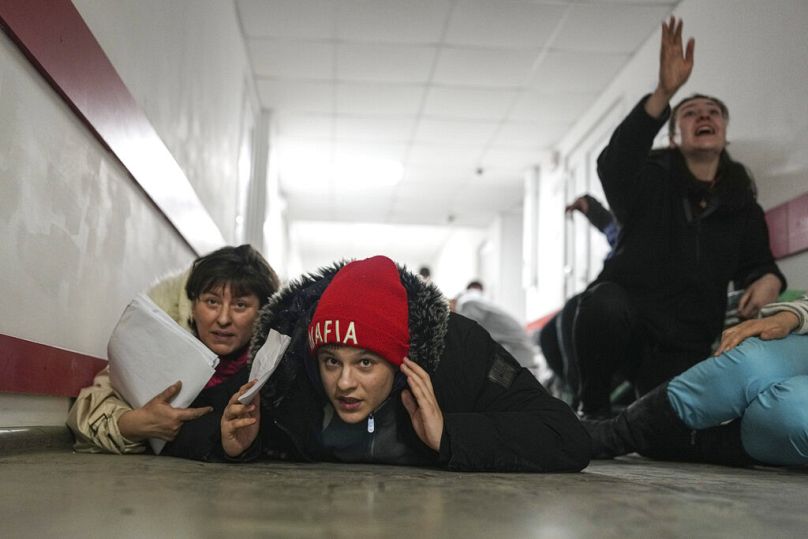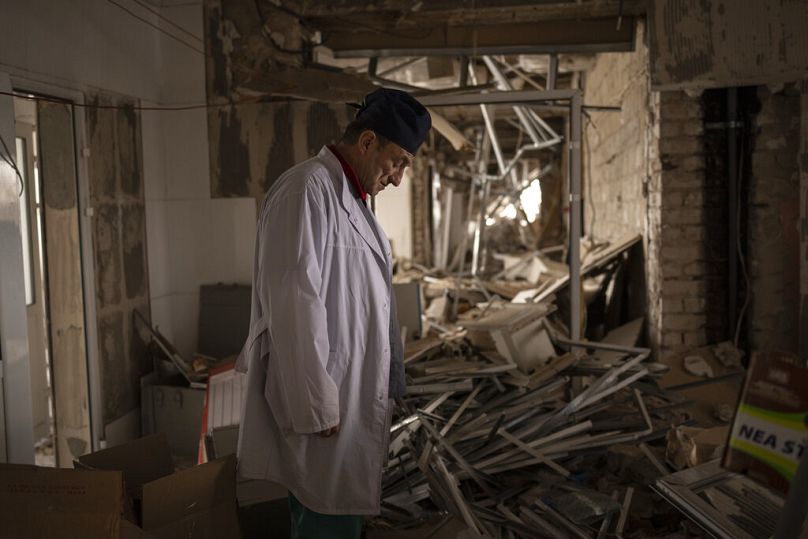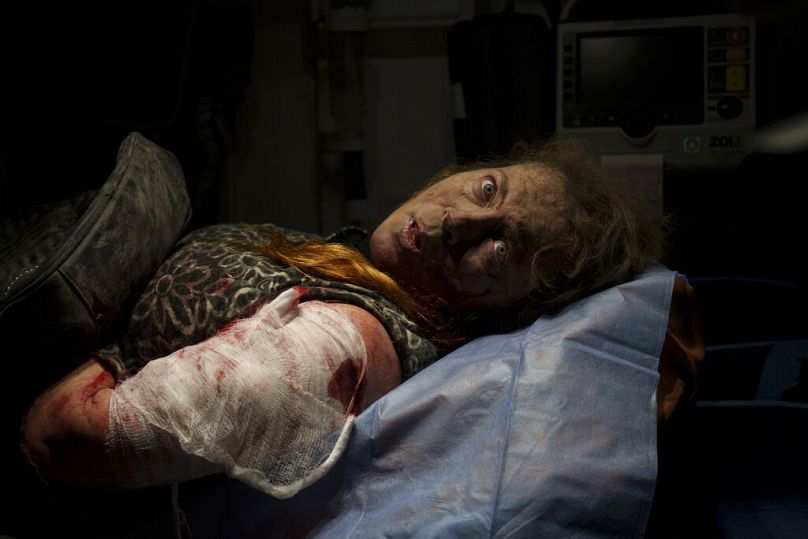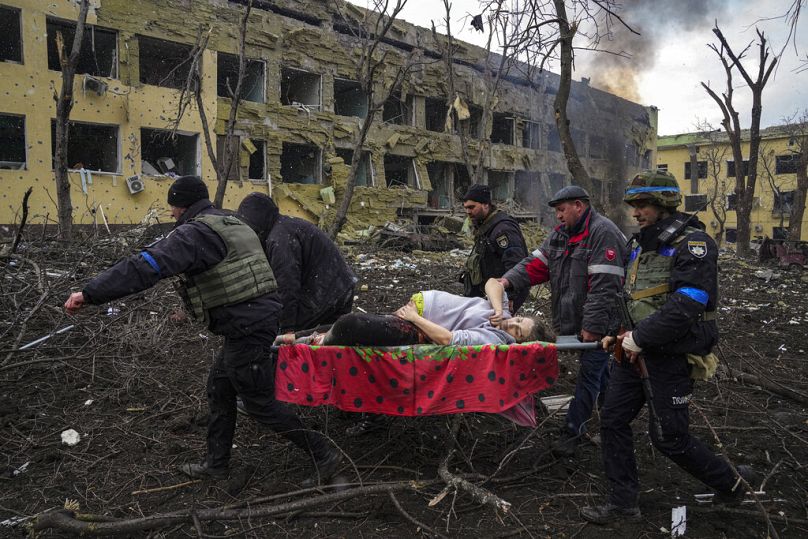Ending violence against civilians and indiscriminate attacks on civilian infrastructure is essential for Ukrainians to begin rebuilding their lives, Christina Wille and Harlem Désir write.
Every day, Doctor Oleg and his team pack up their medical supplies and depart from the city of Kharkiv in the early morning hours.
His mobile health clinic tours remote villages in the region where the Government of Ukraine has recently regained control.
The services Doctor Oleg’s team provide are essential for the bedridden patients they visit in their homes and for those who have to rely on outpatient services because their local health clinics are still buried in debris.
“There are health centres we go to where there’s nothing, just walls... With no heating and no water, we turn on a generator and a heater and see our patients in such conditions,” says Oleg, who witnessed the siege of Mariupol before fleeing with his family.
“It is often the first time since the war escalated that people have an opportunity to see a doctor. They apologise that they have neglected themselves. They say they are just happy to be alive.”
Attacks on Ukraine's health system are deliberate and indiscriminate
The winter surge in violence has seen repeated attacks on Ukraine’s civilian infrastructure.
But while much media attention has focused on the destruction of the country's energy grid, there has been little focus on the devastation of Ukraine’s health system.
A recent report co-authored by Insecurity Insight highlights how this has impacted civilians in need of medical care, with harrowing accounts of medical staff operating under constant attack.
The findings reveal that the Russian armed forces and affiliated armed groups appear to be violating international humanitarian and human rights law by deliberately and indiscriminately targeting Ukraine’s health care system.
Against this background, mobile health units, such as the one run by the International Rescue Committee’s Doctor Oleg, strive to provide essential care.
Their work has become indispensable as the destruction of health care continues.
However, no matter how dedicated their efforts are, it is hard to speak of rebuilding Ukraine’s health system at a time when attacks on civilian infrastructure are still disrupting daily life and aid operations.
One out of ten of Ukraine’s hospitals has been damaged
Since last February, the war has caused approximately US$2.5 billion (€2.29bn) in damage to health sector infrastructure in Ukraine, while the total reconstruction and recovery needs in the country are estimated at US$16.4bn (€15bn) over the next 10 years.
This year alone, almost US$550 million (€504m) is required to save lives and ensure that 14.6 million people in Ukraine regain access to humanitarian health support.
But beyond the numbers is the daily horror for hospital workers and patients as attacks on civilians and civilian objects continue with impunity.
At the time of writing, the Attacks on Health Care in Ukraine initiative recorded 788 attacks on healthcare in the country since 24 February last year, with WHO documenting 912 such events.
To date, 322 attacks have damaged or destroyed hospitals, with some being hit multiple times. One hospital in the Kharkiv region, where the IRC mobile team is operating, has been hit five times.
Meanwhile, 100 attacks killed or injured healthcare workers, and 65 ambulances came under fire. On average, there have been more than two attacks on health care each day, and one out of ten Ukraine’s hospitals has been directly damaged by shelling.
This systematic violence undermines all elements of health care provision. Older people are particularly heavily affected as prices of medicines have increased, distances to functioning health facilities and costs of transport have grown, while incomes declined.
Before the escalation, as many as half a million patients were treated every month by health facilities that have now been damaged or destroyed; according to the official UN reports, one in every three Ukrainians cannot access medical assistance.
Among 32% of the households recently surveyed by the IRC, at least one family member has had to stop taking their medicines because of the war.
Growing age of brutal impunity
The cases documented in Ukraine are part of a dangerous global trend of brutal attacks on health care in conflict.
Despite health facilities and health workers being protected under international humanitarian law and reinforced by UN Security Council Resolution 2286, all too often, these attacks are carried out with impunity.
In the absence of accountability, there is no check on the trends of violence or its devastating impact on civilian populations. This has become the hallmark of the war in Ukraine but has also occurred in Syria, Myanmar and other protracted conflicts.
To put an end to the growing age of impunity in Ukraine and in other places around the world, impunity must be replaced by accountability.
Accountability starts with documentation. The UN Human Rights Council and its Member States must renew the mandate of the Independent International Commission of Inquiry on Ukraine on an open-ended basis and ensure funding for its continued functioning.
The UN General Assembly should also play a greater role in supporting humanitarian affairs by establishing independent fact-finding missions to investigate attacks on healthcare or aid workers.
However, documentation alone is not enough, and it should be accompanied by robust condemnation of those responsible for attacks.
Strengthening the avenues for accountability is a key ingredient to reducing impunity while monitoring and calling out abuses will only be effective if enforced properly.
To this end, countries should utilise the legal principle of universal jurisdiction to prosecute violations of international humanitarian law and ensure perpetrators are held to account.
Lastly, with two Ukraine reconstruction conferences fast approaching, donors need to commit to robust investment in a strategy for the Ukrainian health system’s recovery alongside continued humanitarian support for essential medical services.
People need our protection
There are many tangible steps that donors, international partners and INGOs can undertake to protect people like Doctor Oleg through prevention and mitigation of the risks faced by frontline healthcare workers on the ground.
It is vital that this practical support responds to their specific local needs and concerns.
The tragic images of rescue workers pulling people out of the rubble of former maternity wards painfully illustrate that people are continuing to pay the highest price for this war.
This needs to stop.
No child should be born under a barrage of missile strikes.
No patient should die buried under rubble from a hospital they visited seeking care and protection.
No doctor should lose his life while trying to save others.
Ending violence against civilians and indiscriminate attacks on civilian infrastructure is essential in order for Ukrainians to begin to rebuild their lives.
Christina Wille is the Director of Insecurity Insight, and the co-author of the report “Destruction and Devastation: One Year of Russia’s Assault on Ukraine’s Health Care System.” Harlem Désir is the Senior Vice President for Europe at the International Rescue Committee.
At Euronews, we believe all views matter. Contact us at view@euronews.com to send pitches or submissions and be part of the conversation.















